I started this blog with a introductory post titled “…And some have greatness thrust upon them”. This Shakespearean quote has never been quite so relevant as it was last week during the MA Wikipedia Editathon. The class was grouped together and tasked with editing a Wikipedia page of our choice while tweeting about the process using the hashtag #EditWikiLit. As someone who has only ever live tweeted the Eurovision Song Contest, I was more than a little nervous about the process. Since my first year in university, lecturers have been warning students not to use Wikipedia as a source never mind as a reference in an essay. Yet the open access, free for all online encyclopedia can be a fantastic resource for students and academics alike. The crucial element is to correctly reference the articles, otherwise it does become unreliable and lives up to its reputation as an inaccurate source.
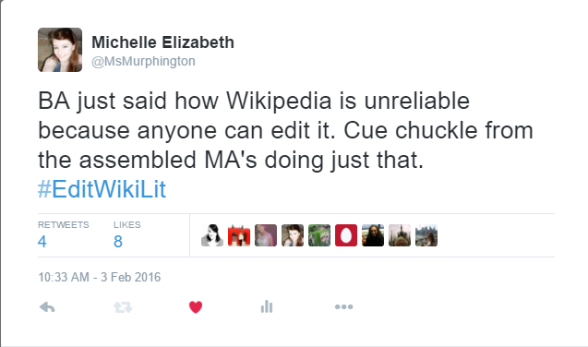
Before the exam, I looked at Early Modern plays that were overlooked on Wikipedia. Playwrights such as Shakespeare have fully expanded pages on their work, with sections on critical theory and cultural impact complete with hyperlinks to pages solely dedicated to the protagonists. Sadly, many other Early Modern works are barely given a complete introduction never mind a factually correct synopsis. Much to my dismay, the Wikipedia page for John Lyly’s Gallathea (or Galatea) was among the latter category.
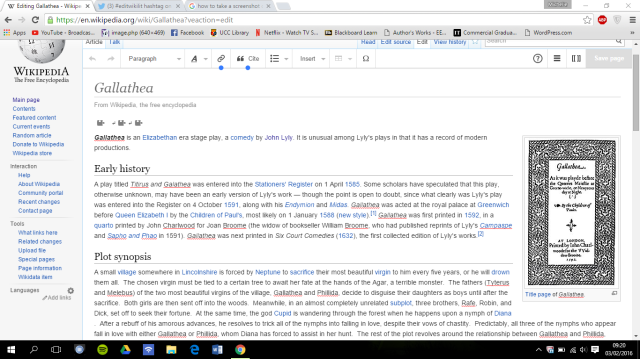
The main issues with the original page were the lack of introduction, unclear plot synopsis and and a visually unappealing layout. Firstly, I expanded on the introduction, wary of writing one that was too long. The primary problem with the original introduction was the lack of clarity regarding the play’s title. Gallathea can sometimes be referred to as Galatea. When searching for academic articles and essays, the search can turn up different information depending on which spelling you use. After that, I included information on the play’s first performance and a small bit of cultural context. It was at this moment I encountered my first challenge, inserting hyperlinks. After some initial struggles, I successfully created a hyperlink to Queen Elizabeth I‘s Wikipedia page. And so began the many, many more hyperlinks.
Next was the layout. The original page had the list of characters as a sub-section within plot synopsis. Given that the play features a large cast including Greek deities, the character list needed to come before the plot synopsis. My earlier success with hyperlinks carried through and Diana, Neptune, Venus and Cupid were each allocated one. Furthermore, I provided information on who the characters were i.e. a villager, a nymph or one of the Miller’s sons. The plot synopsis was poorly developed with little detail given. The play is quite a complex one, and if anyone needed a summary, this one would not provide an accurate one. And thus began the longest part of the Editathon. Thankfully, I had done a considerable amount of work in the days prior to the exam and was confident on my synopsis.
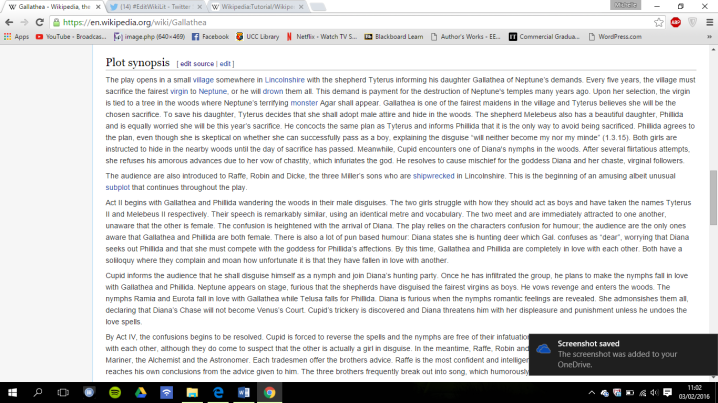
The hardest part of the exam was the criticism and critical analysis. There was no such section on the original page but I could have easily spent another two hours writing a complete one. Given the time constraints of the exam, I included what I feel were the crucial elements to the play. It may have been shorter than I could have liked but it was a necessary element to the page. Without it, or more importantly, references, the page would have remained an unreliable source.
The entire exercise may have been a challenge but it was one I was delighted to take on. The MA’s were grouped together and we interacted with one another in person and on Twitter. The company and support reassured us all and we were even able to help one another at times. For example, a classmate asked me about Middle French as I studied the language in my undergraduate degree.
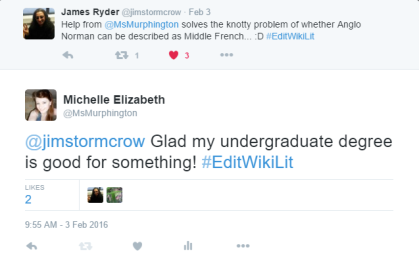
During the exam, a group of second year BA Digital Humanities students shared the space with us and gave presentations. In any other exam, it would have been a distraction but it only added to the experience, enhancing our interaction. Aside from developing my editing skills, the editathon highlighted how useful Twitter can be. Due to my incessant tweeting, the Shakespeare in Ireland blog picked up one of tweets. This resulted in Andy Kessan, an academic who specialises in John Lyly, tweeting me, delighted the page was receiving some attention.
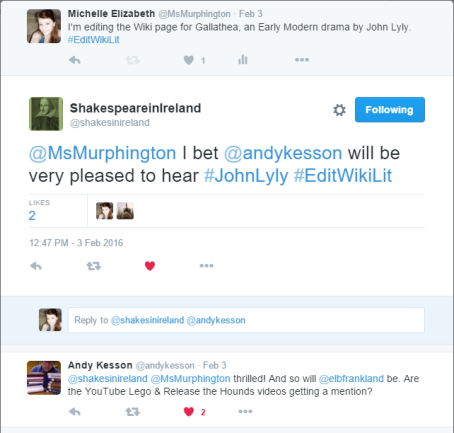
Although we were being examined on our editing abilities, the entire process was enjoyable and extremely revealing. Twitter has become a valued tool in academic life, particularly at conferences and symposiums. The exercise also demonstrated how important is to proofread any piece of work. The original article has some typos which needed correcting. I was pleased with the final result and would consider editing more articles within my field of study.
